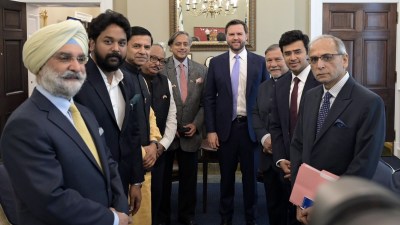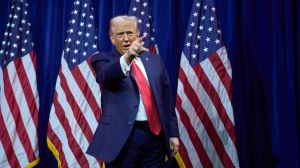Sinha hints at automatic FDI regime
STANFORD, JUNE 1: Union finance Minister, Yashwant Sinha said here on Thursday that foreign direct investment regime will be further liber...

STANFORD, JUNE 1: Union finance Minister, Yashwant Sinha said here on Thursday that foreign direct investment regime will be further liberalised and asserted that disinvestment programme will gain momentum in the coming months.
Indicating that the Centre, in close cooperation with states, was working towards a time-bound corporatisation of state electricity boards, Sinha said the approach to disinvestment would be to emphasise strategic sale of identified PSUs and reduction of government equity in non-strategic units.
8220;The entire receipt from disinvestment is proposed to be used for retiring public debt, restructuring of potentially viable public sector units and meeting expenditure in social sectors,8221; he said in his keynote address at a conference on India8217;s economic prospects here.
8220;India8217;s policy for foreign direct investment provides clear guidelines for entry, freedom of location, choice of technology, production and repatriation of capital and dividends,8221; Sinha stressed apparently to woo foreigners and NRIs to invest in India.
Maintaining that India would move on to 7-8 per cent growth path this year, Sinha underlined the need to curb mounting fiscal deficit of the Centre and states which, he said, was 8220;very crucial8221; for reforms to have impact on the economy. Noting that globalisation was erasing boundaries, Sinha criticised the erection of new barriers to trade by developed countries to deny market access to third world.
8220;While quantitative restrictions and tariff barriers are falling, new and sophisticated barriers are being raised to prevent goods and products of developing countries from competing in the markets of developed countries,8221;he said
Even though the World trading system was more open than ever before, the emerging new non-tariff barriers had adverse impact on developing countries8217; poor, he said adding this called for a change in the mind set of decision makers.
Listing out the next phase of reforms, Sinha said rationalisation of user charges on utilities and services, industrial restructuring and reduction in fiscal deficit would get topmost priority of the government.
8220;We intend to shortly introduce a fiscal responsibility law to restrain the government from indulging in avoidable fiscal excesses,8221;he said adding Expenditure Commission will go into the question of growing subsidy and suggest ways to eliminate wasteful expenditure.
Admitting it would not be easy to deal with the challenge posed by weakening fiscal situation, Sinha said power sector reforms had become critical as the commercial losses of SEBs now accounted for half of the revenue deficits of states.
The difficult fiscal situation called for rationalisation of electricity tariff and improvement in operational efficiencies in transmission and distribution of power in the interest of consumers, Sinha said.
To curb built-in expenditure growth, structural changes need to be brought about in the composition of government expenditure, he said.
Admitting that the government was still to cover significant ground on financial sector reforms, Sinha said 8220;a true market cannot really operate in other sectors unless there is real competition in the financial sector as well.8221;
He also emphasised the need for a global architecture for poverty alleviation just as international financial architecture and said 8220;global social stability is as important as global financial stability.8221;
8220;Let us join in an unrelenting battle against poverty in the world so that the promise of a new economy is felt everywhere and no nation is left behind,8221; he said.
Asserting that the next few years would be 8220;India8217;s decade of development, Sinha said 8220;I see information technology as an area of great potential for foreign investment.8221;
While the technological capabilities of the US are undisputed, India has emerged a front runner in IT, he said, adding8221; the strong foundation of knowledge-based industries in both countries puts us on a similar wavelength and provides common ground for expanding business interestquot;.
- 01
- 02
- 03
- 04
- 05































